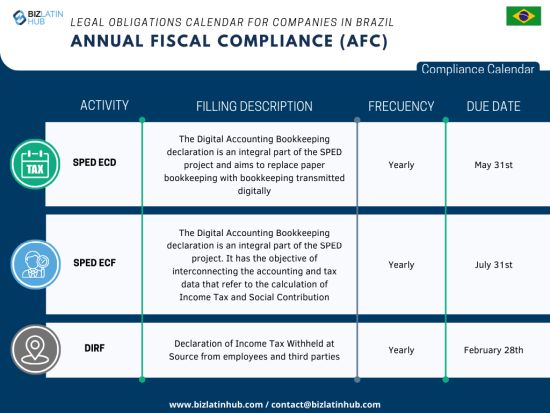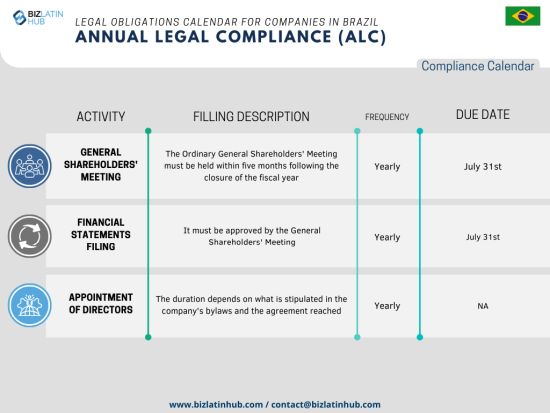- within Corporate/Commercial Law topic(s)
- in United States
- within Corporate/Commercial Law topic(s)
- in United States
- with readers working within the Media & Information industries
- within Corporate/Commercial Law and Tax topic(s)
Understanding corporate compliance requirements in Brazil is crucial to the success of your business. Multinational executives will expect corporate regulations to differ across the countries they do business in. If this is your first commercial expansion into Latin America, you will notice that corporate compliance regulations vary greatly compared to other regions.
Corporate compliance regulations influence the Brazilian business environment, so it is important to understand them in detail if you choose to do business in the country.

We recognize the challenges that come with adapting to new legislation, especially when it comes to complying with corporate obligations. To simplify this process, Biz Latin Hub has designed this Annual Fiscal Compliance Calendar. Corporate compliance in Brazil
Overview: Corporate Compliance in Brazil for Your Limited Liability Company (LLC)
Any company in Brazil, regardless legal entity type, must comply with a series of regulatory obligations over the calendar year. Fulfilling your corporate compliance requirements in a timely manner will help your company manage risk, and avoid liabilities.
Below, we outline the main compliance rules applicable to Brazil's Limited Liability Company (LLC) structure, known as the Sociedade Limitada.
1. Corporate Obligations for the Brazilian LLC
If your Limited Liability Company (LLC) in Brazil has a foreign shareholder, it is mandatory to register the capital invested by that shareholder. You must register this capital before the system of the Brazilian Central Bank (Banco Central do Brasil).
To complete this requirement, you must provide information on the shareholder, disclose the amount invested in the Brazilian LLC, and hand over supporting documents illustrating the company's operations.
In addition, you must file minutes of the LLC's shareholder meeting/s by April 30th every year. The minutes should include the following:
- Review of the management accounts
- The company balance sheet plus economic performance
- Information on designated administrators, where applicable
- Decisions on any other matter included on the agenda
You must ensure that all books are updated to reflect the company's current situation. Please note that part of managing the accounting books must be done online.
Note: Companies that possess more than 240 million Brazilian Reais in assets or have a gross revenue over 300 million Brazilian Reais, must publish their financial statements (i.e. balance sheet, statement of retained earnings or accumulated losses, income statement for the year, and cash flow statement) publicly.
Bylaws Requirements
- Personal identification information for each shareholder, including nationality, marital status, profession, ID document, address, and CPF nº (Brazilian tax identification number, which must be obtained by a foreign partner).
- Definition of the company's business purpose, which must be in accordance with Brazil's CNAE system, where each business activity has a corresponding descriptive code.
- Information on the company's capital and each shareholder's quota. Must include the value of a quota as well as the percentages applied to each owner.
- Information on the company's representative/administrator, who must be a Brazilian citizen or a foreigner with permanent resident status. Foreign shareholders who do not have permanent resident status cannot be administrators.
Requirements for Administrators and Representatives
- Foreign shareholders must be enrolled in the Brazilian Federal Revenue's taxpayers' registry. For that purpose, they must appoint an individual resident in Brazil with powers to represent them before the aforementioned authority and to manage their assets in Brazil. This process can be initiated online but must be completed within 90 days of the initial filing. Complete it by submitting information about the ultimate beneficial owner (UBO) of the company, along with any relevant supporting documents.
- It is also important to bear in mind that in case the relevant shareholders and/or managers are not residents in Brazil and do not intend to become residents, certain actions must be completed in advance. This includes appointing an attorney in Brazil to represent any non-resident individuals for corporate and tax purposes.
2. Taxes and Fiscal Obligations
Brazil, throughout its republican history, has battled to find the best way to optimize its tax system.
The Brazilian tax system is regulated by the Federal Constitution and other state and municipal laws. Each tax authority administers specific regulations. As part of corporate compliance in Brazil, each company must pay taxes to the federal, state, and municipal tax authorities.
There are different types of taxes and, consequently, there are different types of tax returns.
The main federal taxes applicable to an LLC in Brazil are:
- IPI: Taxes Over Industrialized Products
- IOF: Financial Transactions Tax
- IRPJ: Corporate Income Tax
- CSLL: Social Contribution to Net Income
- COFINS: Contribution for Social Security Financing
- PIS: Social Integration Program.
For the main federal tax returns, a Limited Liability Company in Brazil must comply with the following:
- DCTF: Federal Tax Debt Statement
- EFD Contribuições: Digital Tax Bookkeeping Contributions
- ECD: Digital Accounting Bookkeeping
- ECF: Fiscal Accounting Bookkeeping
- DIRF: Withholding Income Tax Statement.
Brazil has a complex taxation system. If we consider state and municipal tax returns on top of those listed above, the list of accounting compliance requirements for companies in Brazil can be extensive.
Recent governments have passed tax reforms with the aim of simplifying this system but they have been only partially effective. Only experienced accountants have the necessary expertise to handle corporate taxation obligations.
Using an experienced local accounting and taxation specialist is the best way to fully meet corporate compliance requirements in Brazil and protect your company from non-compliance issues.
3. Labor and Social Security Obligations
As with taxation, labor compliance requirements can also be complex in Brazil.
Fortunately, the government has recently passed reforms on labor regulations and social security. Since 2017, labor legislation has become more flexible, and the government and labor courts now enforce legal certainty for new hires.
To ensure compliance with corporate requirements in Brazil, companies must take note of the following obligations regarding labor:
- Paid vacation: 30 days of paid vacation for every 1 year of work
- Vacation allowance: one-third salary allowance on vacation salary amount (salary x 0.333)
- 'Thirteenth Salary': paid before December 20th
- Contribution to Social Security: Paid over the total salary amount (8% to 27.6%)
- Deposit Guarantee Fund (FGTS): Paid over the total salary amount (8%)
Note: Every employer must enroll its employees in the INSS (National Social Insurance Institution or Instituto Nacional do Seguro Social).

In order to simplify processes, Biz Latin Hub has designed this Annual Legal Calendar with fundamental responsibilities that every company in Brazil must attend to. Corporate compliance in Brazil
Keep Tabs on Due Dates
In summary, to avoid the incidence of fines or other penalties, make sure you meet all corporate compliance requirements in Brazil with the following in mind:
- Compliance with local rules on tax incidence
- Understand how to accurately calculate the contributions owed
- Due dates for payments and filing statements
It's important to engage with a trusted provider who has comprehensive knowledge of corporate compliance in Brazil, to ensure your company operates in accordance with local law and doesn't miss deadlines. That way, company executives are free to focus on business growth and development.
Common FAQs on Entity Legal Compliance in Brazil
Based on our extensive experience these are the common questions and doubts of our clients on corporate legal compliance in Brazil:
The following are the most common statutory appointments for
Brazilian legal entities:
– An appointed Local Director, who will be personally liable,
both legally and financially, for the good operation and standing
of the company. This person can either be a local national or a
foreigner with residency in Brazil.
– A Certified Local Accountant (CPA) registered with the
authorities on behalf of the company.
– A Shareholder's Legal Representative for each foreign
shareholder. This person can either be a local national or a
foreigner with residency in Brazil.
Yes, a registered local Fiscal Address is required for all entities in Brazil for the receipt of legal correspondence and governmental visits.
Engage with our Specialists to Meet Corporate Compliance Requirements in Brazil
At Biz Latin Hub, our team of local and expatriate professionals in Brazil routinely support foreign entrepreneurs entering the market and doing business in full compliance with local law.
We offer a full suite of market entry and back-office support for expanding multinationals in Brazil and the wider Latin American region, making us your single point of contact for full legal and accounting services. This includes company formation, corporate compliance, legal representation, accounting, hiring, visa processing, due diligence, and other business solutions.
The content of this article is intended to provide a general guide to the subject matter. Specialist advice should be sought about your specific circumstances.


